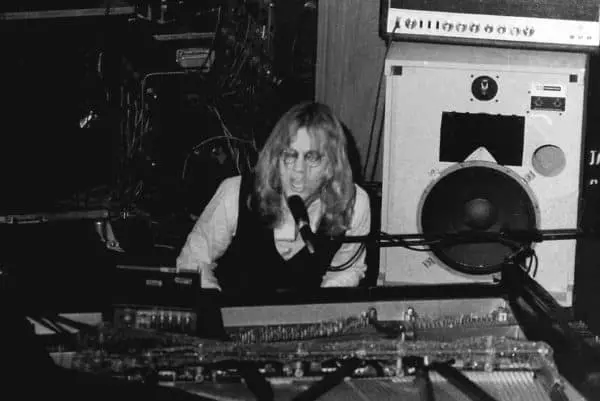
Warren Zevon began a decades-long career in music when he left high school at 16 years old and moved to New York City to become a folk singer. Over the years, he was signed and dropped by multiple labels and produced many albums, both as a solo artist and in collaborative efforts.
Songs like “Werewolves of London” and “Keep Me in Your Heart,” his well-known album Excitable Boy, in addition to his many contributions to other musical greats, cemented his place in musical history. But his career was cut short at just 56 years old when childhood exposure to asbestos caught up with him.
A Career of Ups and Downs
Throughout his career, Zevon saw many successes with his music and just as many flubs. After leaving high school to begin his career, he started by composing jingles and songs for several artists before having the opportunity to tour with the Everly Brothers in the 1970s. After some traveling and trying to get his career off the ground, Zevon found himself living with Stevie Nicks and Lindsey Buckingham, famed members of Fleetwood Mac.
In the mid-1970s, he worked with Nicks and many other contributors on his debut self-titled album, which dropped in 1976. Though just a modest commercial success, the album today is considered a masterpiece. Perhaps Zevon’s biggest success came just two years later with his album Excitable Boy, which received both commercial success and critical acclaim.
Following another successful album, Zevon saw some setbacks in his career. His next couple albums didn’t see the same level of popularity or acclaim, and hardships in his personal life and relationships led him to heavy drug and alcohol use. After a stint in rehab, Zevon threw himself back into new albums. During the 1980s and 90s, he changed record labels and recorded solo albums and collaborations, with varying levels of success.
It wasn’t until 2000 that critics said Zevon had his next comeback with his album Life’ll Kill Ya. In the early 2000s, Zevon continued to see success with his following album and continued appearances as a bandleader on Late Night with David Letterman. But as he was back on the upswing with his music, his health began to deteriorate.
“Enjoy Every Sandwich”
Zevon was known to have a phobia of doctors, causing him to forgo regular appointments much of his life. Shortly before his mesothelioma diagnosis, Zevon began feeling dizzy and developed a chronic cough. After experiencing pain and shortness of breath for some time, people encouraged him to finally see a physician to address what would later be recognized as mesothelioma symptoms. The news was definitely unexpected.
Zevon was diagnosed with pleural mesothelioma in fall 2002, and his initial prognosis gave him just a few months to live. Though it’s not completely clear how Zevon was exposed to asbestos, his son attributed exposure to his days playing in his father’s carpet store attic. With the wide use of asbestos through the mid-1970’s, it’s possible Zevon could have faced exposure from a number of places in his childhood and early life.
Zevon’s cancer was considered to be terminal, and he decided to forgo any kind of treatment. Mesothelioma is an aggressive cancer, meaning the treatment needs to be just as aggressive when approached in a curative manner. Given his poor prognosis, Zevon didn’t want treatment to hold him back, and instead worked on his last album, The Wind.
Throughout his career, Zevon had a strong bond with David Letterman and appeared on his show often, even saying that Letterman was one of his biggest supporters. In an interview with Letterman in 2002, not long after his diagnosis, Zevon said, “I might have made a tactical error in not going to a physician for 20 years.” Though mesothelioma, even when detected early, generally has a rather grim prognosis, earlier detection gives patients more treatment options and a better chance at survival.
Despite facing a terminal case, Zevon remained witty and in good spirits. When asked if he knew anything about life and death, Zevon wryly offered his typical quote on dying: “Enjoy every sandwich.”
Despite his weakening state, in his last months Zevon filmed a VH1 documentary that followed the creation of his last album. Though he initially expected to have just months to live, he survived to see his two grandsons born in June and the release of his final album in August. The Wind reached 12 on the U.S. charts, which was the most successful since Excitable Boy in 1978.
Zevon died at home that September, though his success carried on after his death. He was nominated for five Grammy Awards, ultimately winning two for Best Contemporary Folk Album and a collaboration with Bruce Springsteen. These Grammys were the first he had received during his long career.
Warren Lives On
In addition to his own musical legacy, Zevon’s son Jordan works tirelessly in his father’s honor today. A musician and songwriter himself, Jordan is upholding his dad’s musical legacy. In addition to his passion for music, Jordan is serious about getting asbestos banned. He serves as a national spokesperson for the Asbestos Disease Awareness Organization (ADAO) to help bring better awareness and understanding to asbestos and asbestos-related diseases.
Most recently, Jordan will be performing at the Miles for Meso event held a few days after Mesothelioma Awareness Day, to celebrate the day and continue raising awareness. The benefits from the event will go to the ADAO, and Jordan hopes work like this can continue making an impact in the fight to ban asbestos and help prevent others from facing his dad’s fate.




